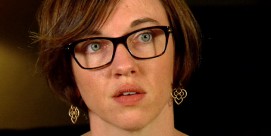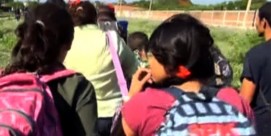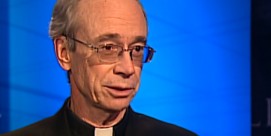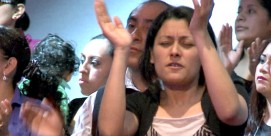In This Episode << SLIDE LEFT TO SEE ADDITIONAL SEGMENTS
Exploring Religious America, Part Three: Catholicism in America
BOB ABERNETHY: Now, part three in our series, “Exploring Religious America.” Earlier, we looked at the new diversity of religions in this country. Last week, at American Protestantism.
Today, Roman Catholics, the largest single group of American Christians. There are more than 60 million U.S. Catholics — 40 percent of all the Christians in the country.
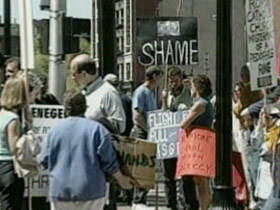
Since last January, when the story broke in Boston, Catholics have been infuriated by the news that hundreds of U.S. priests have had to step down because of evidence and accusations that, over the past 20 years, they had sexual relations with children and adolescents, and that many Church officials covered it up.
ROSEMARY RADFORD REUTHER (Garrett Evangelical Seminary, Evanston, Illinois): People who were known to have these problems were shifted around, and the people in the next parish or the next diocese were not told. The anger is really with the hierarchy.
ABERNETHY: But despite their anger, at least for now, polls and interviews say Catholics remain as devoted as ever to their essential beliefs and practices. We asked Catholic scholar and biographer of John Paul the Second, George Weigel, to sum up the doctrine that is at the heart of Catholic faith.
GEORGE WEIGEL (Biographer of John Paul II): I would say the essence of Catholicism is Jesus Christ, the sure conviction that in Jesus of Nazareth, God entered human history in the person of His son, for the salvation of the world.
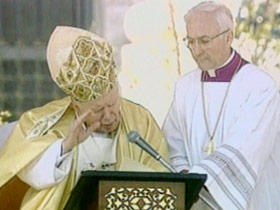
ABERNETHY: The Pope, elected by the Cardinals, leads the Church in its two primary missions. It interprets Scripture to teach Catholics how to live so they’ll have eternal life.
Then, the Church’s priests administer the sacraments through which, Catholics say, God grants them the grace and strength to live as the Church teaches. Father Richard McBrien is a theologian at the University of Notre Dame.
Father RICHARD MCBRIEN (Theologian, University of Notre Dame): Catholicism is a tradition with sacramental vision. It sees God in all things, not as a reality separate from the natural world. He created it. Our only access to God is through things of the earth, and each other.
Mr. WEIGEL: In a Catholic vision of reality everything discloses something else. Water and salt in baptism disclose the salvation of God — at work in an individual life. Bread and wine in the eucharist become the body and blood of Christ. Stuff counts in Catholicism.
ABERNETHY: Confirmation is another of the seven sacraments. So is marriage or, for priests, ordination. There is confession, or reconciliation, and blessing the sick and dying.
Father Andrew Greeley, a Catholic sociologist at the University of Chicago, says there is also another pillar of being Catholic.
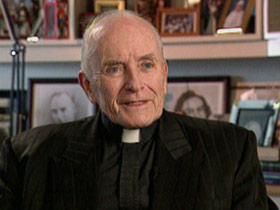
Father ANDREW GREELEY (Catholic sociologist, University of Chicago): Catholics are Catholics because they like being Catholic. They like the stories. Christmas, Easter, the saints, the angels, the mother of Jesus. Some people might think they’ve become cliches through the century, and maybe for some they have.
But for most Catholic lay folks, no. The images and the stories are what hold us in the Church — despite, sometimes, our leadership.
ABERNETHY: There is also in American Catholicism a strong sense of family identity, a legacy, perhaps, of the many years when most Catholics were immigrants, primarily from Ireland, Italy, and Germany. It was their Church that not only ministered to them spiritually but built a vast infrastructure of Catholic institutions to help them — schools, hospitals, charities, and other associations.
By 1960, when John F. Kennedy was elected the nation’s first Catholic president, many Catholics had become well-educated and assimilated. Anti-Catholic discrimination largely disappeared and, on many fronts, independent-minded Catholics insisted on their rights to disregard and even protest some Vatican teachings. According to Andrew Greeley, these independents are:
Fr. GREELEY: People that have decided they are going to be Catholic on their own terms. They are Catholic; they are strongly Catholic; they like being Catholic. But they are not going to let Church leadership dictate the terms of belonging.
ABERNETHY: So, although many Catholics ignore some Church teachings and are angry about the scandal, at the same time they remain loyal to their tradition and deeply devout. Judy Valente reports from Chicago.
JUDY VALENTE: St. Mary of the Woods Church and School, on the northwest side of Chicago. Parishioners have gathered for a St. Patrick’s day party. This neighborhood has a lot of Catholics, and a lot of Irish-Americans. Next door in the gym, two of the daughters of Eileen Durkin and her husband John are performing an Irish dance.
EILEEN DURKIN: My faith is — it’s what I breathe. It’s the lens through which I view my life. Taking care of my children, doing any other work I do, I try to treat people with respect. All those things are from my faith identity. I asked my daughter the other day what it meant to her to be Catholic, and she said, “celebration.”
When we do the sacraments, when we do baptism, we always have a celebration. Baptism for me is that initial reminder that this child is loved, and that this child is a member of a larger family than our own.
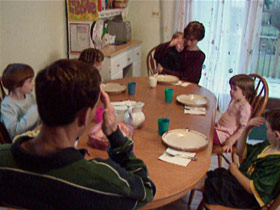
VALENTE: Eileen was one of seven children. Now she has five of her own.
Ms. DURKIN: We say grace every day at meals. We pray with our children, individually, before we put each one down to bed. My prayer life is constant, and constantly in need of improvement. I talk to God at various parts of the day. I will either thank God or I will beseech God.
VALENTE: Like many Catholics, she has a special reverence for the Virgin Mary — for her, the model of a woman who knew joy, and who suffered.
Ms. DURKIN (Praying): Remember, O most gracious Virgin Mary, that never was it known that anyone who fled to thy protection, implored thy help, or sought thy intercession, was left unaided. That prayer is particularly moving in my life, because it was one of the last prayers that my dad said when he was dying.
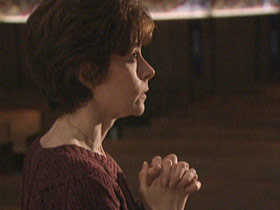
(Praying): To thee I come, before thee I stand, sinful and sorrowful. Oh mother of the word incarnate, despise not my petitions, but in your mercy hear and answer me.
It was his childhood prayer. And it was just a wonderful thing for me to see that he had something from his childhood, he had a faith from his childhood that he brought with him and that was comforting to him, and inspiring to him at this, at this point of his death.
VALENTE: A profound sadness has come over Durkin because of the sexual abuse scandals. And she is angry. Her anger is directed not so much at the perpetrators as at those who covered up.
Ms. DURKIN: I just want change. I want things to move on — but not move on without change. I want there to be some kind of atonement. Our money has been squandered, our good will. It’s been embarrassing. I’m worried about the Church’s social mission and how that might lose credibility. And I think there should be apologies made to the priests and sisters who are out there doing very good work and who are tainted by this.
VALENTE: Durkin says the conduct of some priests, and the cover-up, have no effect on the strength of her faith. Nor do some of the Church pronouncements on moral issues. She can disagree with them, and still be a good Catholic.
Ms. DURKIN: Because Catholicism is more to me than just pronouncements — it’s life. It’s lived. It’s the people I’m with. It’s the experience of Jesus Christ in my life. I think there are good people out there trying to live their lives in the world, respectfully, in committed relationships. The Church has to listen to people who are in homosexual relationships, in premarital relationships, people who may be using birth control.
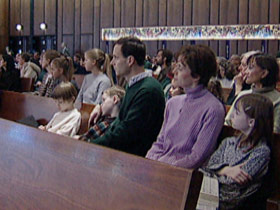
VALENTE: Sunday morning. It is a five-minute walk from home to St. Mary of the Woods Church.
Ms. DURKIN: I bring whatever is in my life to Mass. So, if things are going well, I’m bringing it all to Mass. If things are going poorly, I’m bringing it all to Mass.
PRIEST AT MASS: …gather us together…
Ms. DURKIN: My husband and I met at church. Certainly part of our courtship was an understanding that faith was important to each of us.
PRIEST AT MASS: Next, they took the man born blind to the pharisees. It was the Sabbath.
Ms. DURKIN: I love to listen to the stories of the scripture.
PRIEST AT MASS: They threw him out of the synagogue. When Jesus heard, he asked him…
Ms. DURKIN: I’ve heard the stories before because they’re repeated every couple of years, but I’m a different person every time, so each time the story hits me in a new way. And then the homily — I’m usually sitting there as I’m listening to the homily thinking how am I going to apply this to my life. That’s a very active thought time for me.
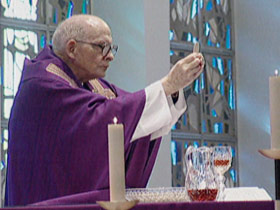
VALENTE: After the homily, the consecration of the host. Priest at Mass: He broke the bread, gave it to his disciples and said, take this all of you and eat it. This is my body, which will be given up for you.
Ms. DURKIN: This is it. This is a visible symbol of what it’s all about, because this is a reflection of the body of Christ. I’m always aware that as the host is held up, that it is going to be broken, and that Jesus died, that he was crucified, that he was broken, but that he was made whole again, and that this is reflecting our lives and that our lives are broken and our lives are blessed, and that we have the potential to be made whole again. For me it’s the real presence of the body of Christ in this piece of bread.
PRIEST AT MASS: Let us proclaim the mystery of faith.
Ms. DURKIN: I like the mystery. I like the truth of the myth as much as the truth of the matter…
PRIEST AT MASS: The peace of the Lord be with you always.
Ms. DURKIN: The sign of peace is just — I think it’s a reconciling first with my family, whoever’s there and that’s just a concrete way, you know, to give one of my kids a kiss and say “the peace of Christ be with you” and then to reach, to reach around to the people around us.
PRIEST AT MASS: Lord I am not worthy to receive you.
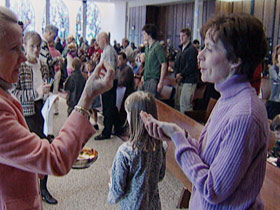
Ms. DURKIN: We have communion… we walk forward to receive the body and blood of Christ… it’s a mini-pilgrimage. Each of these people, whether I know them or not, they have this entire depth that I may not see, and other people may not see, but they have a life, and they may have somebody who is sick in their lives, they may have somebody who was just born in their families. I know that I’ve got a lot going on in my life, and they’ve got it too, and we’re in this together.
VALENTE: In terms of salvation and the afterlife, how do you view non-Catholics?
Ms. DURKIN: When I was in second grade, I had a nun who told us that all good people could go to heaven. I believe that God loves all people, and that issues of the after-life and salvation are best left to God.
PRIEST AT MASS: The Lord be with you.
VALENTE: The final blessing by the priest, as the mass ends.
Ms. DURKIN: I feel refreshed. I feel renewed, I feel empowered. Go out into the world and be more joyous. Be more loving. Be more forgiving. Be more compassionate. Do the work of God in your daily lives. That’s my Catholicism. That’s what I believe, that light is stronger than dark, that life is stronger than death. Love stronger than hate.
ABERNETHY: One of the ironies of American Catholicism is that the Church that was once primarily a Church of immigrants — who moved into the mainstream of America and the middle class — is now, once again, to a growing degree, a Church of immigrants. Recent surveys estimate that Hispanics now make up from 15 to 30 percent of all American Catholics. One forecast says Hispanics could comprise half the Church in 15 years.
The Hispanic Catholic experience, now. Again, Judy Valente.
JUDY VALENTE: This neighborhood on Chicago’s west side was once home to east European immigrants. Now it is called La Villita — “little village.”
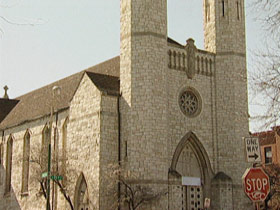
LETICIA ESTRADA: Our Community is primarily Mexican. We make the church… and being able to be within my own community, family, friends, neighbors, to share that with them means a lot.
VALENTE: Leticia Estrada and her husband, Fernando, moved several miles away a few years ago but still come back to the church of their childhood, the Church of the Epiphany — the church of their immigrant parents.
Ms. ESTRADA: Ever since I can remember, I’ve been going to Epiphany and that’s the church I’ve known. I did my first communion, and this is where I stood way back when I was in third grade.
VALENTE: And this is where she chose to get married.
Ms. ESTRADA: Now I’m an adult and now I’m coming back and being able to do another sacrament and say “this is the person I want to marry.” It kind of comes full circle for me.
VALENTE: The Virgin Mary is highly revered throughout the Latino community. After saying her vows, Leticia placed roses at a shrine to the Virgin…
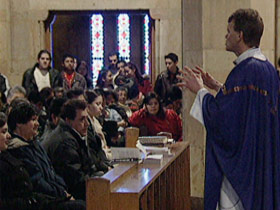
Ms. ESTRADA: She’s Jesus’ mother but she’s also my mother, and being able to thank her, to thank her for helping me find somebody in my life to share the rest of my life with.
VALENTE: The pastor at the Church of the Epiphany is a Spanish-speaking Irish American. Three of the four masses at the parish are now in Spanish.
Ms. ESTRADA: If you’re Catholic and you’re Hispanic, there’s no separation, in my opinion. It’s hard for me to even think of being anything else. My Mom, she many years ago would only have — be able to go to an English Mass. There was no such thing as a Spanish Mass.
It’s filled with people of devotion, people who want to be there, and who want to pray and who want to be closer to God.
VALENTE: When the priest consecrates the host and the wine, do you think you’re really seeing the presence of God there?
Ms. ESTRADA: Oh, most definitely, most definitely. I don’t want to call it a miracle, but something very close to it. And it’s not a piece of bread, that’s not what it is. It’s Christ. That’s his body. That’s what I’m there for.
VALENTE: After mass, the community gathers in the church basement for a Mexican breakfast.
Ms. ESTRADA: I went to Epiphany school and so did my husband. We graduated from there. Giving back to community, that’s pretty much what we’re doing.
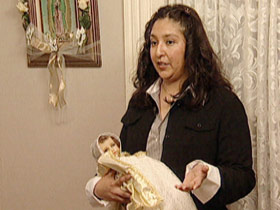
Father PETER MCQUINN: The Latino community in the Catholic Church is thriving.
Ms. ESTRADA: God, Jesus, faith in the spirit, I think is a much more tangible, living thing, part of the regular everyday life. The Latino community, I think, much more than in the Anglo community, sees God, Jesus, the Church, living our lives as Christians, on a daily basis.
VALENTE: Later, at home, Leticia displays a daily reminder of her faith.
Ms. ESTRADA: I got him from Mexico and I brought him back. You can’t really find baby Jesus this big here in the United States. He’s blessed by the priest. It is a religious symbol to me and, actually, to a lot of Hispanics and a lot of Mexicans. My mom instilled that in me. She has one in her home. Before I go to work I’ll go and I’ll just touch him, look at him, make the sign of the cross. And just hope that I have a good day. That’s what I ask of him — to look after me, during the day.
ABERNETHY: The most immediate issue facing the American Church, is, again, what to do about the sex abuse scandal.
Pope John Paul II called U.S. Church leaders to Rome to discuss what should be done. Now, the U.S. bishops are preparing to meet next month to come up with new policies. They are getting advice from all sides. The bishops hear from liberal Catholics that part of the problem is the Church’s tradition of all-male, top-down, behind-closed-doors management. Liberals say they want more democracy and openness.
Sr. CAROLYN FARRELL (Loyola University, Chicago): A more collaborative, inclusive spirit, not just what the Bishop says. Let’s have some input. I think we need women’s voices at the table.
ABERNETHY: Others note that there are 13,000 fewer priests today than 15 years ago, to serve a larger Catholic population. They think the bishops should address both the scandal and the priest shortage, and urge the Vatican to ordain women and let priests marry.
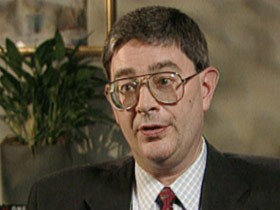
In our new RELIGION & ETHICS NEWSWEEKLY poll, conducted last month with U.S. NEWS & WORLD REPORT, we asked Catholics whether they think priests should be allowed to marry. Eighty-one percent of young adults said yes. Fewer than half of older Catholics said yes.
Conservative Catholics like to observe that their 2000-year-old Church is independent of public opinion. George Weigel wants the Church to become more traditional, and, he says, more faithful.
Mr. WEIGEL: It seems to me pluperfectly, blindingly obvious that this crisis is a crisis of fidelity. The way out of this is not “Catholic Lite”. It’s real Catholicism, full Catholicism. And I think that’s exactly what’s going to come out of this, a reinvigoration of classic Catholic faith.
ABERNETHY: Whether the bishops can even come close to meeting all the conflicting expectations that are building remains to be seen. Their meeting opens in Dallas on June 13.
That’s our report on American Catholics. There’s much more, including more poll findings about Catholics, on our Web site. You can also answer our poll questions for yourself.
Next time, our series “Exploring Religious America” continues with a look at the new importance of “spirituality” within churches and apart from them.


